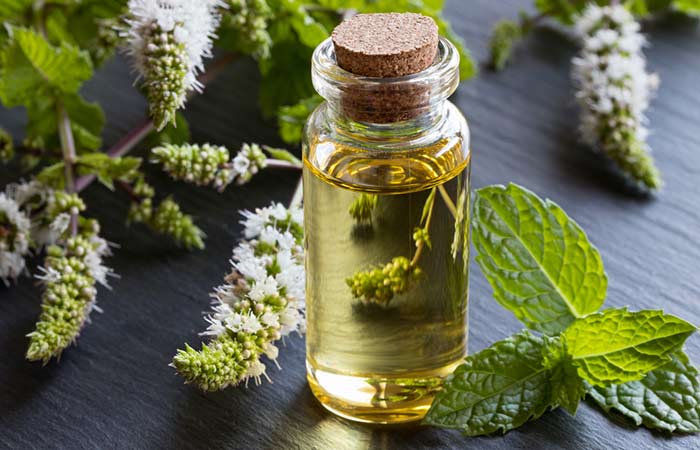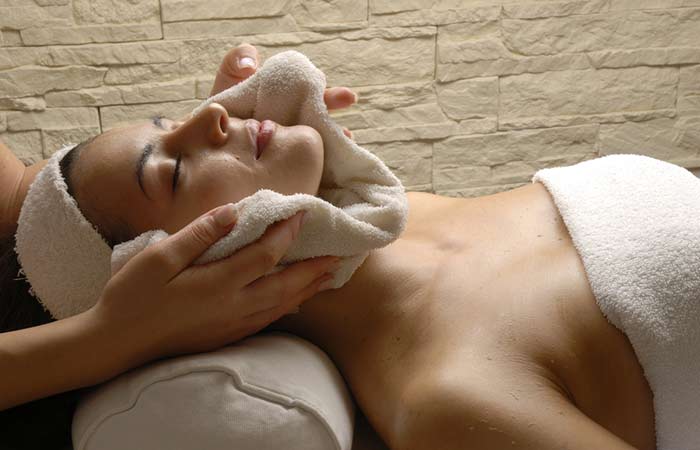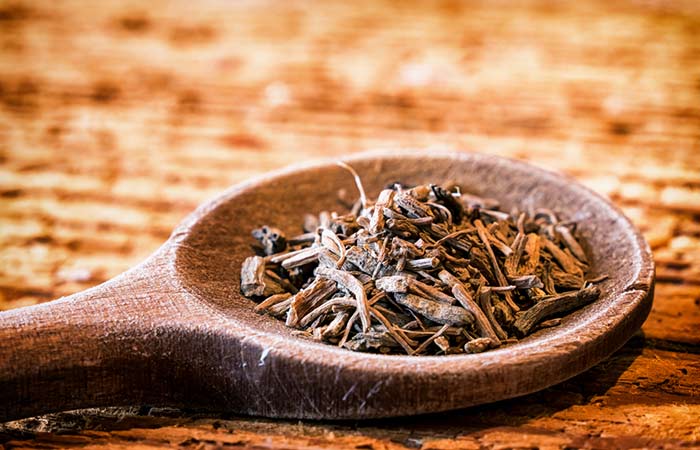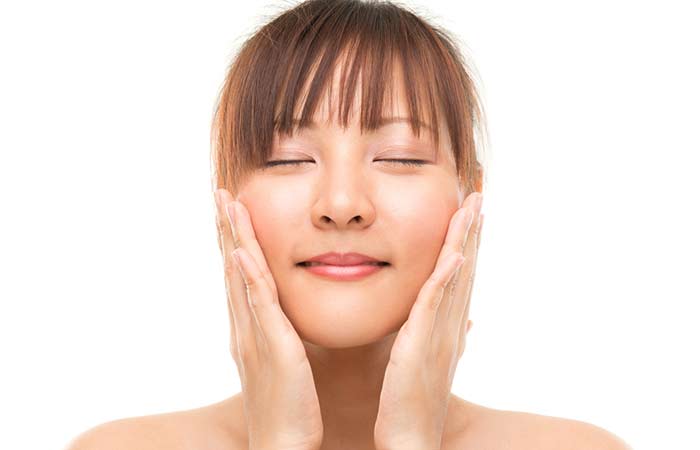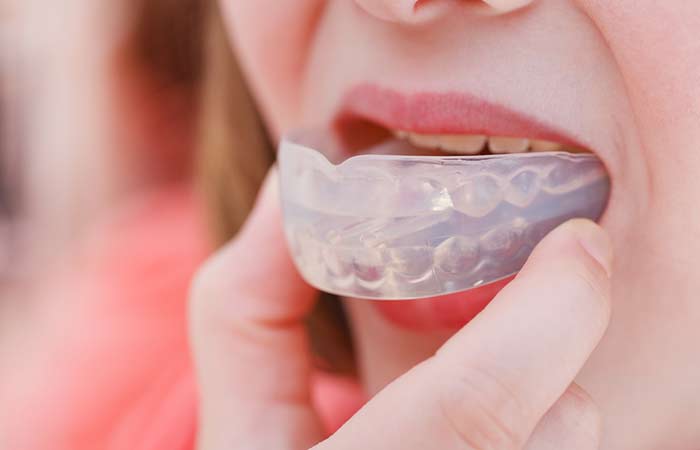Shaheen Naser
Do you often wake up with an aching jaw or a dull headache? It might be because you are grinding your teeth in your sleep. This condition is also referred to as bruxism, and it could occur due to work stress or heavy drinking. It can sometimes also be seen in growing toddlers when they are teething. If you are interested to know more about grinding teeth, the causes and symptoms of this condition, and ways to treat it naturally, continue reading.
Table Of Contents
- What Is Grinding Or Clenching?
- What Causes Teeth Grinding?
- Signs And Symptoms Of Teeth Grinding
- How To Stop Grinding Teeth Naturally
- Preventive Tips
What Is Grinding Or Clenching?
Grinding or clenching of teeth is a parafunctional and involuntary activity. Bruxism is a medical term that is used to define this condition. Although bruxism is more common while sleeping, the affected people can continue doing this even while awake. This condition is not a threat if its occurrence is occasional. But it could have extreme consequences if it occurs regularly (1).
Let us now look at the causes behind the development of this condition.
What Causes Teeth Grinding?
Teeth grinding can occur as a result of multiple factors. The most common causes include:
- Anxiety: Individuals facing stress and anxiety have a higher probability of developing this condition (2).
- Medications: In certain cases, teeth grinding is a side effect of prescription medicines like antidepressants.
- Sleep Disorders: If you snore while sleeping or face difficulty falling asleep, you are more prone to grind your teeth while asleep.
- Sleep Paralysis: This a phenomenon that leads to temporary immobility while falling asleep or waking up. Sleep paralysis can also lead to teeth grinding.
- Smoking And Drinking: Tobacco use and drinking alcohol are some other factors that prompt teeth grinding.
- Caffeine: Caffeinated drinks like tea and coffee can also increase chances of bruxism.
Since teeth grinding usually occurs during one’s sleep, it may go unnoticed until its symptoms begin to surface.
Signs And Symptoms Of Teeth Grinding
The signs and symptoms associated with teeth grinding could vary in their severity. However, it is important to identify the symptoms at the earliest to avail proper treatment. They are as listed below:
- Hard clenching or grinding of teeth that may cause you to wake up
- Flattened and chipped teeth (3)
- Worn out tooth enamel
- Tightened and aching jaw muscles
- Earache
- Frequent headaches
- Pain in the facial muscles
A prolonged occurrence of teeth grinding can result in irreversible damage to your teeth. Hence, it is necessary to treat this condition at the earliest. Mentioned below are some natural remedies that can help stop teeth grinding.
How To Stop Grinding Teeth Naturally
- Essential Oils
- Warm Compress
- Valerian Root
- Turmeric With Milk
- Massage
- Vitamins And Minerals
- Yoga And Exercise
- Mouthguard
Home Remedies To Treat Grinding Teeth
1. Essential Oils
a. Lavender Essential Oil
You Will Need
- 3 to 4 drops of lavender essential oil
- 1 teaspoon of olive oil
What You Have To Do
- Mix a few drops of lavender essential oil with olive oil.
- Apply this mixture all over your neck and jaw.
- Massage gently.
How Often You Should Do THis
Do this at least twice daily.
How This Works
Lavender oil contains bioactive compounds that are known to induce relaxation (4). It also reduces stress and anxiety and helps you sleep properly. Lavender oil calms the nerves and muscles around your jaw, thus solving the problem of treat teeth grinding (5).
b. Peppermint Essential Oil
You Will Need
- 3 to 4 drops of peppermint essential oil
- 1 teaspoon of coconut oil
What You Have To Do
- Mix a few drops of peppermint essential oil with coconut oil.
- Apply this mixture all over your neck and jaw and massage gently.
How Often You Should Do This
Do this at least twice daily.
How This Works
This oil makes you feel refreshed and also helps in calming your nervous system (6). A massage with peppermint oil before bedtime will help in stopping you from grinding your teeth.
c. Chamomile Oil
You Will Need
- 4 to 5 drops of chamomile essential oil
- 1 teaspoon of olive oil
What You Have To Do
- Mix chamomile essential oil with a teaspoon of olive oil.
- Apply this mixture all over your neck and jaw.
- Continue to massage for 5 minutes.
How Often You Should Do This
Follow this remedy twice daily for best results.
How This Works
Like its counterparts, chamomile oil is a natural way to relieve stress and anxiety. It relaxes your muscles and has a calming effect on your senses. This, in turn, helps stop teeth grinding.
2. Warm Compress
You Will Need
- A washcloth
- Hot water
What You Have To Do
- Take a clean washcloth and soak it in hot water.
- Wring out the excess water and cover your neck and jaw with the washcloth.
- Repeat this 4 to 5 times.
How Often You Should Do This
Do this at least twice daily.
How This Works
Applying a warm compress to your neck and jaw will relax the muscles in that area. This will stop you from grinding your teeth and clenching your jaw (7), (8).
3. Valerian Root
You Will Need
- 1 tablespoon valerian root
- 1 cup of water
- Honey (optional)
What You Have To Do
- Add the valerian root to a cup of water.
- Bring this mixture to boil in a saucepan. Simmer for 5 minutes.
- Strain the tea and add honey for flavor.
- Drink this tea.
How Often You Should Do This
Do this once every night.
How This Works
Valerian root is a part of a flowering plant that is often used to treat insomnia, anxiety, and restlessness due to its sedative properties (9). Studies have also proven it to be effective in treating a condition called restless leg syndrome, which is quite similar to teeth grinding in its occurrence (10).
4. Turmeric With Milk
You Will Need
- 1 teaspoon of turmeric powder
- 1 cup of milk
- Honey (optional)
What You Have To Do
- Boil the milk in a saucepan.
- Add turmeric powder to this and stir continuously.
- Add honey for flavor and drink this before it turns cold.
How Often You Should Do This
Do this daily before your bedtime.
How This Works
While turmeric is well known for its anti-inflammatory and antioxidant properties, milk contains a sedative amino acid called tryptophan (11), (12). When combined, milk and turmeric can help relax your jaw muscles and relieve the pain associated with teeth grinding.
[ Read: 11 Amazing Benefits Of Turmeric Milk ]
5. Massage
You Will Need
1 bowl of warm water
What You Have To Do
- Warm some water and transfer it to a bowl.
- Rinse your face and neck with this water.
- Pat your face dry and gently massage your neck, jaw, and shoulders in a circular motion.
- Continue massaging for about 5 minutes.
How Often You Should Do This
Do this daily before going to bed.
How This Works
A gentle massage before going to bed helps relieve your stress after a long day. It also helps to relax your muscles and induces sleep (13), (14). The relaxing effects of a simple massage can thus be of great help in treating the condition of grinding teeth.
6. Vitamins And Minerals
The correct balance of vitamins and minerals is necessary to help your body function properly. A deficiency in any of them is known to cause a variety of health problems, including stress and anxiety. Vitamins such as vitamin C and B complex vitamins are necessary for the proper functioning of your adrenal glands and managing your stress levels. Any deficiency in these vitamins may lead to recurrent mood swings and increased psychological stress.
Similarly, a deficiency in minerals such as calcium and magnesium can lead to insomnia, hyperactivity, anxiety, and restlessness. All these nutrient deficiencies have the potential to worsen the symptoms of teeth grinding. Thus, it is recommended to consult your doctor and restore these deficiencies, if any (15), (16), (17).
7. Yoga And Exercise
The stress and anxiety that you face in your everyday life can head to teeth grinding in your sleep. One of the best ways to deal with this situation is to indulge in activities that induce peace. Including yoga and exercise in your daily routine can help improve the functioning of your immune and circulatory systems. Regular exercise will relieve stress and anxiety, while yoga and meditation will help your mind and body be at peace (18), (19). You can exercise or practice yoga at least 3 to 4 times in a week to relax your muscles and prevent grinding of your teeth naturally.
[ Read: 10 Effective Yoga Poses To Cure Anxiety ]
8. Mouthguard
Mouthguards are one of the best and most conventional treatments that can help you deal with grinding teeth. If you are looking for a quick fix for your problem, a visit to the dentist for a mouthguard is your best bet. Other than protecting your teeth from further damage, mouthguards can also help alleviate aching jaws. Any grinding noise associated with the condition will also be reduced to a great extent with this treatment.
In addition to the remedies mentioned above, you should also take some precautions to prevent teeth grinding. Making a few healthy lifestyle changes and following the preventive tips mentioned below can help in combating this phenomenon and also save you from making frequent trips to your dentist.
Preventive Tips
- Control your urge to grind your teeth while you are awake
- Indulge in stress relieving activities like music and exercise
- Limit your intake of caffeinated drinks and alcohol
- Avoid smoking
- Use a mouth guard to prevent your teeth from grinding
Teeth grinding can have ugly consequences if not treated on time. It can also have a negative impact on the quality of your life. Thus, it is advised to treat this condition as soon as you notice its onset. Although the remedies mentioned here can help you overcome this condition, it is also recommended to visit your dentist for a follow-up.
Recommended Articles
- What Causes Falling Sensation While Sleeping?
- Top 10 Effective Home Remedies To Curb Bed Wetting In Children
- 10 Best Night Guards For Teeth Grinding
- 10 Wonderful Remedies To Stop Thumb Sucking Habits In Children
- Vicco Vajradanti Toothpaste Ingredients


